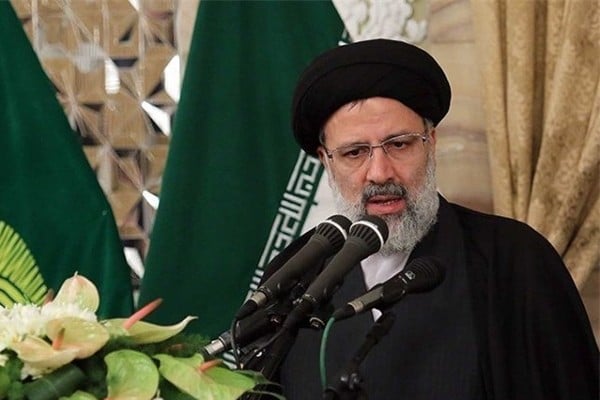The Iranians have been raising the ante while the U.S. and other Western countries appear to be desperate for a deal.
By Batya Jerenberg, World Israel News
Iran’s president expressed pessimism regarding the ongoing nuclear talks in Austria while belittling their importance to his country during a nationally televised speech Friday.
“We put our hopes on the east, west, north, south of our country, and never have any hope in Vienna or New York,” Ebrahim Raisi said in Tehran, praising his country’s self-sufficiency during the annual commemoration of the victory of the 1979 Islamic Revolution.
“Looking toward the West has made the country’s relations unbalanced, we need to look at all countries and capacities in the world, especially our neighbors,” he added.
“Our revolution is based on principles, one of which is political and economic independence from world powers. We will continue this way until the future with great confidence and hope.”
The negotiators returned to the table in Vienna on Tuesday after taking a break for ten days to allow for government consultations regarding the latest round of indirect talks between Iran and the United States. Little progress was reported towards a compromise acceptable to both sides that would allow the 2015 nuclear deal to be renewed.
On Wednesday, White House spokesperson Jen Psaki sounded both optimistic and pessimistic regarding the negotiations. She said that a deal is “in sight,” but “if it is not reached in the coming weeks, Iran’s nuclear progress will make it impossible for the United States to return” to the Joint Comprehensive Plan of Action, the official name of the 2015 deal according to which Iran reduced its nuclear program in exchange for sanctions relief.
However, Iran has been found to conceal its continued nuclear activity notwithstanding the agreement. In 2018, then-U.S. President Donald Trump withdrew from the deal and renewed sanctions on the Islamic Republic.
Nevertheless, the Biden administration has been committed to reviving the deal.
Iranian officials have blamed the Americans for prolonging the talks instead of agreeing to the last offer the mullahs had put on the table.
Iranian news agency IRNA reported Saturday that a source at the talks had confided that the EU, Russia and China were also blaming the Biden administration, complaining “about the confusion and inability of the United States to make a political decision on the outcome of the talks.”
This is in direct contrast to the many reports being aired over recent days of optimism regarding an imminent deal.
Russia’s chief delegate in Vienna, Mikhail Ulyanov, told a Russian paper last week, “We are five minutes away from the finish line…. A draft of the final document has been crafted. There are several points there that need more work, but that document is already on the table.”
China’s chief delegate in Vienna said Saturday that Iran had offered its “final package” of concessions and demands, and that “all parties agree that we have reached the final stage” of the talks. German Foreign Minister Annalena Baerbock used the same “final stage” language when describing the talks on Sunday during her first official visit to Israel in this capacity.
America’s ‘fundamental error’ in negotiations
Political and military analyst Elliot Chodoff led an Honest Reporting trip to the Syrian border last spring, where he discussed, among other topics, the Iranian threat.
“You have to be incredibly naive or have an outstanding supply of hallucinogenic drugs to believe that the Iranians are not trying to get nuclear weapons. The question is: How do you stop them?” Chodoff said.
Pointing to what he described as the “fundamental error” regarding negotiations over the nuclear deal, he continued:
“Somewhere along the way, the negotiations went from the objective of stopping the Iranian nuclear weapons program to coming to an agreement. In other words, part of the objective of the seller is convincing the buyer that he wants an agreement…
“The minute you transmit that you’re not willing to walk away, the price is going to go up and terms are going to go against you. And that’s what happened.”
According to Chodoff, “the Iranians are playing it perfectly correctly. They’re raising the ante. They’re raising tensions, and now they can be ‘moderate’ and go back to where they were,” before the Trump administration withdrew from the deal.
The Americans, under the Biden administration, “are saying we really really really really really want to talk to you. This is a bad opening move.
“The Americans are suggesting compromise; the Iranians are saying all or nothing….These are classic opening moves.”





